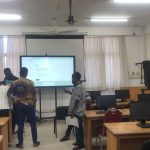Assistant lecturer at the Department of Dance Studies in the University of Ghana, Godson Atsu Sorpkor has praised the media for helping to spread national identity and the nation’s cultural legacy.
This follows Radio Univers formal launching of Ghana Month at the station. The majority of the time, March is set aside as ‘Ghana Month’ in order to showcase Ghana’s culture and encourage travel by emphasizing and telling the history of the Ghanaian people in various ways.
During this period, several media outlets in the nation highlight a number of events, such as broadcasting the history of Ghana, to commemorate the day that honors the declaration of Ghana’s independence from British colonial authority.
Speaking in an exclusive interview with UniversNews, Godson Atsu Sorkpor emphasized how modern media platforms like Twitter, in addition to radio and television, are significantly contributing to the dissemination of Ghana’s national identity throughout the country by making nationals more conscious of their national identity.
“This time around, I am seeing people becoming more conscious of their identity, their values and norms based on what the media is actually doing because we also have social media specifically not just like the radio and television but Instagram, Twitter and the rest. All of these, things they are actually trying to project, you get a particular image that talks about a particular area, and I think it is actually making a head way.”
He also added that performing arts education should be included in all levels of education across the country in order to preserve cultural history and transmit it to the future generation. He however bemoaned the lack of adequate resources among other challenges in inserting the arts in education.
“Now, we are trying to make sure that we have performing arts in all schools and all levels from the basic to the tertiary. That is a very interesting area we need to look at. It is picking up gradually [but] we don’t have the materials and other things. So, we are getting practitioners for them to work on. But the issue here is that it has to be a conscious effort. What we normally do is that we transfer our knowledge to the younger generation and sometimes due to migration and other things people want to move from the northern part to the southern part for greener pasture and stuff like that and these are some of the challenges.”




